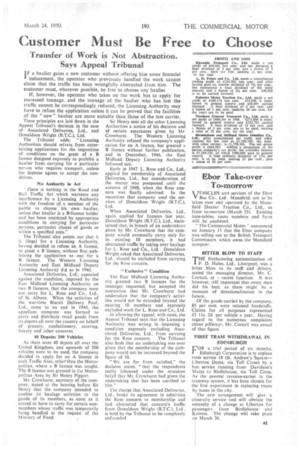Customer Must Be Free to Choose
Page 35

If you've noticed an error in this article please click here to report it so we can fix it.
Transfer of Work is Not Abstraction., Says Appeal Tribunal
IF a haulier gains a new customer without offering him some financial I inducement, the operator who previously handled the work cannot claim that the traffic has been wrongfully abstracted from him. The customer must, wherever possible, be free to choose any haulier.
If, however, the operator who takes on the work has to apply for increased tonnage, and the tonnage of the haulier who has lost the traffic cannot be correspondingly reduced, the Licensing Authority may have to refuse the application unless it can be proved that the facilities of the " new " haulier are more suitable than those of the late carrier.
These principles are laid down in the Appeal Tribunal's decision in the case of Associated Deliveries, Ltd.. and Donaldson Wright (B.T.C.), Ltd.
The Tribunal adds: "Licensing Authorities should refrain from entertaining applications for the imposition of conditions on the grant of a B licence designed expressly to prohibit a haulier from carrying for a particular person who requires transport, unless the licensee agrees to accept the conditions.
No Authority in Act there is nothing in the Road and Rail Traffic Act which warrants any interference by a Licensing Authority with the freedom of a member of the public to choose his own haulier, unless that haulier is a It-licence holder and has been restricted by appropriate conditions to carrying for particular persons, particular classes of goods or within a specified area."
The Tribunal also points out that it is illegal for a Licensing Authority, having decided to refuse an A licence, to grant a B licence, without first publishing the application as one for a B licence. The Western Licensing Authority and East Midland Deputy Licensing Authority did so in 1946.
Associated Deliveries, Ltd., appealed against the condition, imposed by the East Midland Licensing Authority on two B licences, that the company must not carry for L. Rose and Co., Ltd., of St. Albans. When the activities of the war-time Biscuit Delivery Pool, Ltd., came to an end in 1946, the appellant company was formed to carry and distribute retail goods from its depots all over the country on behalf of grocery, confectionery, catering, bakery and other concerns.
40 Depots: 200 Vehicles As there were 40 depots all over the United Kingdom, and upwards of 200 vehicles were to be used, the company decided to apply for an A licence in each Traffic Area, otheethan the Metropolitan, where a B licence was sought. The B licence was granted in the Metropolitan Area by Sir Henry Piggott.
Mr, Crowhurst, secretary of the company, stated at the hearing before Sir Henry that the company intended to confine its haulage activities to the goods of its members, as soon as it ceased to have to carry for certain nonmembers whose traffic was temporarily being handled at the request of the Ministry of Food.
Sir Henry sent all the other Licensing Authorities a notice of his decision and of certain assurances given by Mr. Crowhurst. The Western Licensing Authority refused the company's application for an A licence, but granted a B licence without further publication, and in December, 1946, the East Midland Deputy Licensing Authority followed suit.
Early in 1947 L. Rose and Co., Ltd.,. applied for membership of Associated Deliveries, Ltd., but consideration of the matter was postponed until the autumn of 1948, when the Rose concern was finally admitted. In the meantime that company used the services of Donaldson Wright (B.T.C.), Ltd.
When Associated Deliveries, Ltd., again applied for licences last year, Donaldson Wright (B.T.C.), Ltd., Maintained that, in breach of an undertakine given by Mr. Crowhurst that the company would eventually carry only for its existing 10 members, it had abstracted traffic by taking over haulage for L. Rose and Co., Ltd. Donaldson Wright asked that Associated Deliveries, Ltd., should be excluded from carrying for the Rose concern.
"Exclusive" Condition The East .Midland Licensing Authority granted two B licences for the tonnages requested, but accepted the contention that Mr. Crowhurst had undertaken that the company's activities would not be extended beyond the existing 10 members and expressly excluded work for L. Rose and Co., Ltd.
In allowing the appeal, with costs, the Appeal Tribunal says that the Licensing Authority was wrong in imposing a condition expressly excluding Associated Deliveries, Ltd.. from carrying for the Rose concern. The Tribunal also finds that no undertaking was ever given that the membership of the company would not be increased beyond the figure of 10.
"We are far from satisfied," the decision states, " that the respondents really laboured under the mistaken belief that Mr. Crowhurst had given the undertaking that has been ascribed to him."
The charge that Associated Deliveries, Ltd., broke its agreement in admitting the Rose concern to membership and had abstracted that concern's traffic from Donaldson Wright (B.T.C.), Ltd. is held by the Tribunal to be completely unfounded




























































































